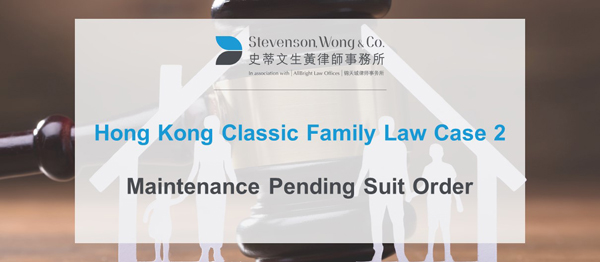In most Hong Kong divorce proceedings, an application for maintenance pending suit (“MPS”) is one of the crucial matters for consideration. It often takes a year for a divorce and even longer when there are disputes in the main suit, custody and welfare of children of the family, and/or ancillary relief and division of the matrimonial assets. Can a party to the divorce proceedings receive maintenance in any kind if he/she does not have sufficient financial resources pending suit?
According to section 3 of the Matrimonial Proceedings and Property Ordinance (Cap. 192) (“MPPO”), Hong Kong Court has the discretion to order a party to the divorce proceedings to pay MPS to the other party. If the financially weaker spouse and/or the children do not have sufficient financial resources to sustain their expenses, the spouse can apply to the Court for MPS. If granted, the Court normally orders payments for MPS to commence immediately, which lasts until the final ancillary relief order or further order of the Court. In making such order, the Court is required to balance the reasonable needs of the applicant spouse and/or the children against the paying spouse’s ability to pay by adopting a broad brush approach.

However, after the MPS Order has been awarded, either party can apply for variation of the said Order due to any change in his/her financial circumstances such as income, assets and/or liabilities. Since the variation will have great impact on the party receiving the MPS, the Court will take extra care in considering any variation application.
In this article, we will share and explain the legal issues in KCMA v ABC and others [2020] HKCFI 1078 in relation to an application to vary the MPS Order.

Background
We acted for the Wife who successfully defended against the Husband’s application to adjust the MPS Order downward at the High Court on an urgent basis during the General Adjourned Period enforced by the Judiciary during the COVID-19 crisis. Pursuant to the previous MPS Order made by consent, the Husband was to pay, amongst others, MPS for the Wife at HK$26,450 per month and MPS for the 3 children at HK$79,350 per month (HK$26,450 for each child).
The Husband sought to reduce the MPS to HK$13,600 per month for the Wife and HK$13,600 per month for each child on the basis that there had been a material decrease in his income.
Legal Principles
Section 11(1) of MPPO empowers the Court to vary or discharge the order of financial provision; section 11(7) of MPPO stipulates that in exercising the power under section 11(1), the Court is required to have regard to all the circumstances of the case and any changes on matter to which the Court was required to have regard when making the MPS Order.

In addition, the Court cited the principles from a Court of Appeal judgment AEM and VFM [2008] 3 HKLRD 36, CACV 261/2006:
- According to s.11(7) MPPO, the Court is required to consider all the circumstances of the case.
- The Court is not required to proceed from the starting point of the original order but look at the matter afresh.
- Any change in any of the matters to which the Court was required to consider when making the original order must be taken into account. For example, the increase in spending necessitated by the growth of children, the adverse impact arisen out of increasing living cost etc. An increase in the wealth of the husband was a relevant factor to be taken into account.
- The basis and intended effect of the original order are relevant factors to which the Court on variation should pay regard and there should not be a radical departure from the approach taken by the parties themselves when they entered into an agreement embodied in a consent order.
Court’s Decision
The husband’s application was refused based on the abovementioned statutory and common law principles. The Court had taken into consideration the following factors:
- The Husband contended that his income was gravely reduced by 40%. The Court compared the husband’s income as at 11 December 2018 (the date on which the MPS order was made) and his present income, his then and present assets and liabilities, comprehensively considered the Husband’s living expenses and reasonable needs, and came to the conclusion that there was no evidence to support the Husband’s case that his income had been reduced by 40%.
- The Court further considered the Wife’s income, assets and liabilities, the children’s and her living expenses and reasonable needs. The Court emphasised that the Wife was a housewife and was wholly financially dependent on the Husband. There was no evidence suggesting there was any alternative source of income available to her. The Court therefore considered that the original MPS Order was reasonable in maintaining the Wife and their children’s daily expenses.
After considering all the factors, the Court decided that the Husband was able to afford the MPS, and that even after paying the MPS, he would still have the funds to cover his daily expenditures.
Although the Husband claimed that the duration of the MPS Order was unexpectedly long, the Court pointed out that the MPS Order had been made by consent, and was based on the Husband’s average income for at least 3 years. There was no evidence that the parties had intended that such agreement was to be re-visited or varied annually.

Commentary
MPS is an important matter to be considered in the divorce proceedings. The Court is required to balance the reasonable needs of the applicant spouse and/or the children against the paying spouse’s ability to pay by adopting a broad brush approach.
When either party subsequently seeks to vary a MPS Order, the Court will carefully scrutinise the application. As the Court of Appeal principle cited by the judge in the present case, “the basis and intended effect of the original order are relevant factors to which the Court on variation should pay regard, and there should not be a radical departure from the approach taken by the parties themselves when they had entered into an agreement embodied in a consent order”.
This article is co-authored by our experienced Private Client Team – our Partners Catherine Por and Wendy Lam, and our Senior Associates Karl Wong and Calvin Lo. Please contact our Catherine Por or Wendy Lam for any further enquiries or information.
This newsletter is for information purposes only. Its content does not constitute legal advice and should not be treated as such. Stevenson, Wong & Co. will not be liable to you in respect of any special, indirect or consequential loss or damage.
